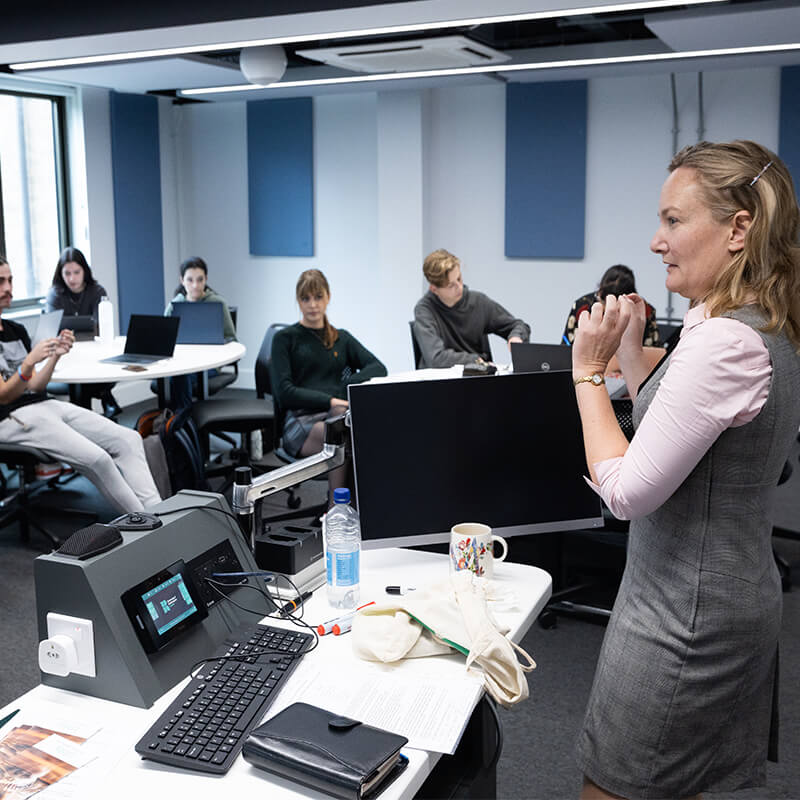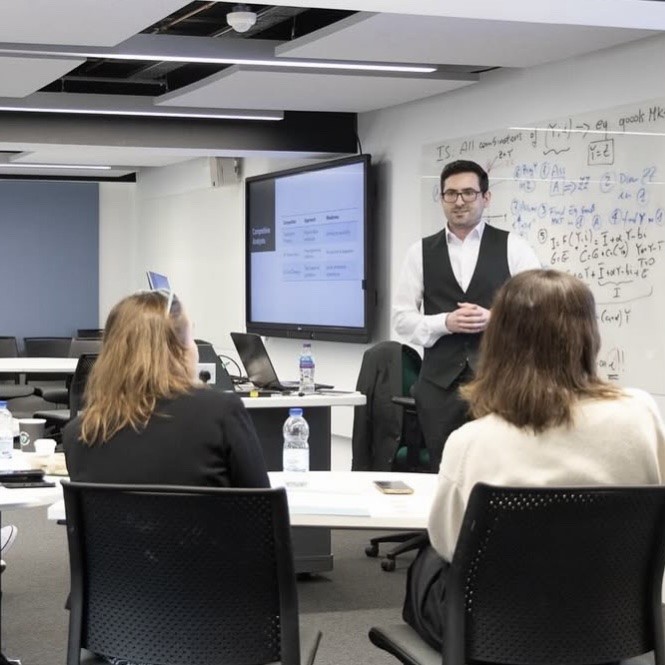Entry tariff:
96–112 UCAS points (or equivalent)
Foundation Year: 64–80 UCAS points (or equivalent)
International Foundation Pathway:
64 UCAS (or equivalent)
IELTS: 5.5
UCAS code:
N1M1
N1M4 (if choosing Foundation Year)
Start date(s):
September 2026
Learn how to navigate complex organisational, regulatory and global environments.
Our BSc Business and Law will help you understand and integrate both business and legal perspectives, which is critical in shaping effective decision-makers in contemporary organisations.
You will learn how to apply legal principles strategically to real-world business challenges, enhancing decision-making and problem-solving across commercial, organisational, and international contexts. Your studies will cover essential business disciplines, such as organisational behaviour, financial literacy, project management, and international business, alongside core legal areas, including Law of Contract, dispute resolution, company law, and the English legal system.
Throughout the course, you will engage in case-based learning, project work, and experiential activities that mirror professional practice, helping you develop critical thinking, analytical reasoning, and professional confidence.
You will also explore ethical, sustainable, and globally informed approaches to business and law, preparing you to become a reflective, responsible, and highly employable graduate.
Key features of the course
- You will study an integrated curriculum of business concepts alongside key areas of law, including Law of Contract, tort, commercial law, and employment law, which will give you a holistic view of the business-legal interface
- An immersive timetable, with two focused days of in-person teaching per week, supporting your deeper learning, reflective practice and co-curricular engagement
- Access to digital resources, interactive teaching and accessible materials to support your learning
Why study business and law at Roehampton?
Gain a competitive edge by tackling current challenges, learning the tools and methods used by professionals, alongside career support.

Real-world learning and applied capabilities
You will build a deep understanding of legal frameworks alongside core business areas such as strategic management, enterprise project management, and commercial operations. You will simultaneously develop critical transversal skills including legal reasoning, commercial analysis, communication, problem-solving, teamwork, creativity, and ethical judgement.

Robust Employability, career coaching and placement support
You will be supported throughout your journey with structured career development sessions that include job search strategies, CV and application support, interview skills, and networking preparation. Our careers team collaborate closely with academic staff to ensure your ambitions are supported by meaningful advice and tailored guidance. Optional work placements, project-based modules, and short-term internships help you gain professional exposure and clarify their career direction.

Professional engagement and industry alignment
This degree maintains close ties with industry through employer panels, expert guest lectures, and practitioner-led workshops. These touchpoints allow you to gain exposure to a variety of business roles and sectors, from corporate legal departments, and regulatory bodies, to management consulting, public policy, business development, and entrepreneurship. Through these experiences, you will gain up-to-date insights into employer expectations and sector-specific trends.
Modules
30 credits
This module introduces you to the structure, principles, and functioning of the English legal system, while developing your academic and practical skills necessary for legal study and future professional success. It fosters a critical understanding of key institutions, sources of law, and the rule of law, and builds competencies in legal research, writing, and argumentation.
Teaching and learning
You will be taught through lectures and workshops that involve a range of learning and teaching approaches, which includes online support and employability-related activities.
Lectures will cover an exploration of the legal principles and structures that comprise the English legal system, while workshops will consist of a blend of interactive activities, group work exercises and debates on set topics designed to support skills development.
You will have time in the workshops to build your assessment skills needed for the course and future employment, for example the ability to develop and present a coherent argument, critical thinking, and legal analysis.
You will visit a court or tribunal for your assessment to gain an insight into the law in action.
Assessment
This module will be assessed by coursework (30%) and portfolio (70%).
30 credits
You will develop your talent, skills and competencies through focused business readiness activities and live global multicultural challenges. We apply industry specific knowledge; use practical case examples; live case studies and issues to draw out the skills and professional attitudes valued by employers; theoretical models and concepts to enable you to gain an understanding of industry requirements helping you transition into employment or entrepreneurship. We use a coaching approach to teaching to build confidence, critical thinking and embed learning into practice.
The module also allows for skill development, competencies in written academic, verbal and technological enquiry/research activities to help you progress through your chosen degree of study. It lays the foundation for further competency development needed to progress through each year which will be built on by other modules. You will engage in learning activities which develop your inclusive leadership skills and competencies in working in global and multi-cultural settings.
You will learn how to transform yourself professionally, enhance your career trajectories, and excel in your chosen fields while navigating the challenges of technological advancements, ethical and sustainability dilemmas, and the evolving demands of the modern workplace.
Topics covered include:
- Developing business sector awareness in team situations and meeting industry challenges
- Inclusive leadership and sustainability practices
- Your future careers, talent management, recruitment and selection, reflective practice, academic skills and technology working
Teaching and learning
You will be taught through lectures and workshops that involve a range of learning and teaching approaches, which includes online support and employability-related activities.
Lectures will be developed around the key concepts, models and frameworks around employability and the world of work, technology and competency development, talent acquisition, careers development and enterprise development.
Seminars will concentrate particularly on the elaboration of specific theoretical approaches with reference to their possible application through the selection of case examples, live business challenges, simulated recruitment and selection activities.
Assessment
This module will be assessed by a professional pitch and personal brand portfolio (50%) and a reflective report (50%).
30 credits
You will be introduced to key concepts and issues relating to business organisations in global environments.
You will focus on globalisation and the different types and objectives of business organisations. You will then cover a range of topics related to assessing the environments within which businesses operate such as economic growth, international trade and global industries. The link between business organisations and environments is further examined within the context of analytical frameworks such as PESTLE, Porter's 5 Forces and Demand/Supply analysis.
Teaching and learning
You will be taught through lectures and workshops that involve a range of learning and teaching approaches, which includes online support and employability-related activities.
Lectures will cover core business environment concepts and analytical frameworks, while workshops will engage you in solving practical global business challenges and strategic decision scenarios.
Workshops will consist of a blend of interactive global business simulations, group work on international market analysis and strategic decision-making exercises, and debates on contemporary global economic issues designed to support analytical and cross-cultural communication skills development.
Assessment
This module will be assessed by a reflective journal (30%) and coursework (70%).
30 credits
You will gain a comprehensive understanding of the principles and doctrines of contract law. This module examines the formation, terms, vitiating factors, discharge, and remedies of contractual relationships, enabling you to analyse and apply contract law principles to practical scenarios and develop critical thinking skills in this foundational area of private law. This will assist you in preparing for professional life, enabling you to develop the ability to present reasoned and logical arguments both orally and in writing.
Teaching and learning
You will be taught through lectures and workshops that involve a range of learning and teaching approaches, which includes online support and employability-related activities.
Lectures will cover the core materials exploring the legal principles that underpin liability in contract law, while workshops will consist of the use and application of the core materials through the use of problem-solving exercises, and specific legal case activities which encourage the general analysis and evaluation of the use of legal rules regarding the topics covered.
Assessment
This module will be assessed by coursework (50%) and an exam (50%).
30 credits
This module helps you understand the challenges organisations face in a changing world influenced by climate change, social and political developments issues, technology, and workplace shifts at a local and global level.
Organisations and their leaders must be suitably adaptable and skilled at every level. The module provides frameworks for decision-making involving all stakeholders, focusing on sustainability, business ethics, social change (equity and social justice), climate change, and active citizenship.
Through case studies, you will tackle issues like governance (employees, managers, communities, consumers, shareholders, collective representation, e.g., trade unions, and so forth), ethical decision making, and the links to social justice. The primary focus and golden thread of this module is addressing the multiple challenging, complex issues that organisations, and the people therein, encounter, ensuring that their values remain consistent and intact in everyday practice.
This module equips you with the skills to navigate a rapidly changing business and social context, emphasising critical engagement with values in political change, influencing change management, and sustainability, key 21st-century employability skills.
Teaching and learning
Each week, you will engage in a meticulously organised learning experience comprised of lectures, an intensive workshop, and an additional 30 minutes of online support.
Lectures are designed to introduce and elaborate upon key concepts and frameworks relevant to the principal areas of the module. These sessions are based on indicative course content, aiming to equip you with a robust theoretical foundation.
Lecture topics will cover a broad spectrum of examples and case-based learning drawn from business ethical practices, values in leadership, sustainability, organisations, citizenship, and societal contexts to illustrate the practical applications of these concepts.
Workshop sessions are intended to delve deeper and put into practice the theoretical approaches discussed. These seminars focus on detailed examination of business case studies. You will analyse various scenarios likely to arise in organisational, management, and situations covering both business and public sector environments.
Assessment
This module will be assessed by a individual community-project report (50%) and a 10-minute group presentation (50%).
30 credits
This module introduces you to the core principles and practices of project management, with a specific focus on their application within entrepreneurial and early-stage venture contexts. Unlike traditional corporate project settings, entrepreneurial environments often require leaner, more adaptive planning approaches due to uncertainty, resource constraints, and rapid iteration.
As such, you will develop the capacity to manage ambiguity, navigate change, and deliver value through disciplined but flexible project delivery methods.
You will be introduced to a range of project management methodologies including Waterfall, Agile, and Lean Startup, allowing you to critically assess which approach is most appropriate depending on project scope, timing, resources and stakeholder complexity. These frameworks are applied through practical exercises and software tools such as Gantt charts, Work Breakdown Structures (WBS), Kanban boards, and PIDs (Project Initiation Documents).
Through scenario-based learning and industry-informed simulations, you will explore the full project lifecycle - from initial scoping and planning, to execution, monitoring, and closure. Attention is given to risk identification and mitigation, stakeholder engagement, budgeting, and the use of key performance indicators (KPIs) to track progress.
The module places strong emphasis on communication and teamwork, where you will be expected to present your project proposals in professional formats, including project posters and written reports, as well as participate in pitch simulations aimed at securing mock investment or executive support.
Teaching and learning
You will be taught through lectures and workshops that involve a range of learning and teaching approaches, which includes online support and employability-related activities.
Lectures will cover core project management principles and enterprise methodologies, while workshops will consist of a blend of interactive project planning activities, group work on stakeholder management and risk assessment exercises, and peer feedback sessions on project pitches designed to support your leadership and project coordination skills development.
By integrating startup case studies, software tools and investor-style evaluation panels, the module provides you with a professionally focused, applied understanding of how to manage entrepreneurial projects effectively. You will learn how to respond to evolving business contexts, justify project decisions using data, and balance innovation with execution discipline.
Assessment
This module will be assessed by a presentation (30%) and coursework (70%).
30 credits
You will develop your knowledge and understanding of the law of torts.
The module begins by situating the law of torts in relation to the broad principles underpinning contract and criminal law; introducing you briefly to the broad range of torts and then focuses on the fundamental principles of liability with particular reference to negligence. Other torts (e.g., nuisance) are considered, as are current issues of particular difficulty and importance in respect of the law of torts.
You will develop your ability to apply the law to legal problems and solve them, as well as the ability to develop a reasoned legal argument and to evaluate the merits of competing legal arguments. The Torts module will also improve your transferable intellectual and professional skills in order to prepare you for further subjects in your course and future employment.
Teaching and learning
You will be taught through lectures and workshops that involve a range of learning and teaching approaches, which includes online support and employability-related activities.
Lectures will cover the core materials exploring the legal principles that underpin tort liability, while workshops will consist of the use and application of the core materials through problem-solving exercises, essay questions and other activities which encourage the general analysis and evaluation of the use of legal rules regarding the topics covered.
Assessment
This module will be assessed by a multiple-choice exam (50%) and coursework (50%).
30 credits
The purpose of this module is to build on the legal principles considered in Law of Contract, giving you the opportunity to study the application of contract law in commercial settings greater depth. The module addresses two broad areas within commercial law, the Sale of Goods, and the Law of Agency.
In the first part of the module, you will engage with issues of key concern to consumers in a variety of modern contexts. Within these areas a number of legal issues will be considered, including fundamental concepts such as what is a sale of goods, property and title, authority, and consent in Agency Law etc.
The module will cover particular areas of practical and/or legal significance, such as sale distinguished from other related transactions, e.g. hire-purchase; implied terms in sale of goods contracts; obligations of delivery and payment; passing of property and risk in goods; sale by a non-owner; remedies of buyer and seller; duties of agent and principal; contracts made by agents; and termination of the agency relationship.
The module balances theoretical principles with practical applications, preparing you to navigate complex commercial legal issues. Through analysis of case law, legislation, and commercial practices, you will gain expertise in identifying and solving legal problems that arise in modern business transactions while developing skills essential for commercial practice.
Teaching and learning
You will be taught through lectures and workshops that involve a range of learning and teaching approaches, which includes online support and employability-related activities.
Lectures will provide thematic coverage of legal rules, case law and statutes, while the workshops will consist of case analysis, legal problem-solving and group discussions. You will develop key skills in legal research using the legal databases and Law Trove and structuring legal arguments through debate.
Assessment
This module will be assessed by a problem-based analysis (50%) and coursework (50%).
This course offers all students the option of a one-year paid work placement, to boost your employability even further. If you choose this route, you will take the placement following year two of your course, and then return to complete your degree.
Why take a placement?
A placement year is the perfect opportunity to gain valuable work experience, to build on the career skills we will teach you on this degree. The connections you make on the placement will improve your career prospects further, and equip you with the skills you need to secure graduate-level employment.
How we support you
The University's Placement and Work Experience Team are experts at helping you to secure a placement. They will work closely with you from the start, helping you research potential employers, discover placement opportunities, create and pitch your CV, and will coach you to perform well in interviews. We aren't able to guarantee a placement, but our sector-leading advisors will give you the best possible chance of securing one.
Find out more about how we'll support you
We understand that your plans might change once you start your programme. If you decide not to do a placement, you will have the option of completing the three year version of your programme.
Whatever your choice, you will have access to many opportunities for work experience through our Placement and Work Experience Team, and access to face-to-face and 24/7 online careers support.
30 credits
This intensive six-week taught module is designed to equip you with the essential competencies needed for professional consultancy practice.
This module serves as the skills-based foundation for the concurrent Roehampton Live Project, providing you with theoretical frameworks, practical tools, and professional capabilities required to deliver high-quality consultancy services to real clients.
Delivered as a professional bootcamp in a blocked format, this module creates an immersive learning environment where you will develop expertise in consultancy methodologies, client relationship management, strategic problem-solving, and professional communication. The intensive structure enables you to build confidence and competence before engaging with live client projects.
You will learn to integrate ethical considerations, social responsibility, and environmental sustainability into your consultancy approach, ensuring that your professional practice contributes to broader societal wellbeing.
Key areas of focus include consultancy frameworks and methodologies, client engagement and relationship management, evidence-based research and analysis techniques, strategic thinking and recommendation development, professional communication and presentation skills, and ethical consultancy practice and sustainability integration.
You will engage in real case studies and simulated client scenarios, working individually and in teams to apply learned concepts. The module incorporates guest speakers from industry, practical workshops, and reflective exercises to bridge theory and practice effectively.
This module prepares you for immediate application of skills in your concurrent Live Project module, where you will work with real clients as part of the ‘Roehampton Business Advice Centre’.
Teaching and learning
The module employs intensive blocked delivery with high contact hours to create an immersive professional development experience. Teaching methods include interactive workshops, case study analysis, simulation exercises, guest speaker sessions, and peer learning activities.
You will have 22 hours of lectures and 33 hours of workshops over six weeks. Lectures and workshops will be interactive in nature providing an environment for sharing business ideas, problem space mapping and evaluation opportunities and carrying business scoping exercise.
Assessment
This module will be assessed through consultancy toolkit portfolio coursework (50%) and a consultancy bid presentation (50%).
30 credits
This transformative capstone module is designed to bridge the gap between academic study and professional practice. You will have the opportunity to apply your academic knowledge in a real-world setting, developing strategic solutions to real-world business challenges.
You will work in consultancy teams as part of the Roehampton Business Advice Service, collaborating with a diverse range of external clients, including small and medium enterprises (SMEs), non-profit organisations, social enterprises, and larger companies. Global engagement projects will also be sought with partners outside of the UK, or projects that can have an influence on communities globally.
Each team will engage with a client to diagnose business problems, conduct in-depth research, and formulate evidence-based recommendations. By making an impact through real-world projects, you will enhance your ability to navigate complexity, synthesise information, and communicate your insights effectively to senior stakeholders.
While teamwork is a core aspect of this module, you will also undertake substantial individual work, ensuring that your personal contributions are critically assessed and aligned with your professional aspirations. The module is structured to simulate a professional consultancy environment, equipping you with the practical skills, commercial awareness, and adaptability needed for leadership roles in business and beyond.
You will be encouraged to develop ethical, socially responsible, and sustainable business solutions, ensuring that your recommendations contribute not only to organisational success but also to broader societal and environmental wellbeing.
Through a combination of practical experience, academic rigor, and reflective work-based learning, you will be empowered to become a strategic thinker, problem solver, and an influential professional. The module is designed to be a stepping stone into a range of career paths, with projects aligned with your own career goals. By the end of this module, you will have built a portfolio of high-quality work that demonstrates your analytical, decision-making, and communication skills.
Teaching and learning
Each consultancy team will be assigned an academic supervisor who will provide structured guidance, feedback, and oversight throughout the project.
You will have scheduled supervision meetings, including meetings with your supervisor at key milestones during the project to discuss progress, challenges, and next steps. Supervisors will support you in managing client relationships and ensure professionalism in communications.
Assessment
This module will be assessed by a consultancy report (50%) and a live presentation (50%).
Optional
30 credits
In an ever-changing world, organisations must make strategic choices based on solid analyses and decision-making processes. This module adopts an innovative teaching approach to illustrate how strategic management theories and models can be applied in different contexts and how they inform decision-making.
You will develop a skill set founded on strategic management theory that will allow you to become an active participant in the strategy process that organisations deploy to ensure their long-term success.
This module will give you a clear understanding of what strategy is all about and how organisations develop it. You will learn how to apply the essential concepts and tools of strategy that will be useful in their business career whichever sector they choose.
Main topics revolve around the strategic position of organisations, the concept of competitive advantage (how to gain competitive advantage and/or sustain it for longer), and evaluation of business strategies. After a closer look at business and corporate levels of strategy, the module ends with selected aspects of implementation.
Teaching and learning
You will be taught through lectures and workshops that involve a range of learning and teaching approaches, which includes online support and employability-related activities.
Seminars will involve critical analysis of real-life cases to address a range of strategic problems. In this way, you will develop commercial awareness and recognise drivers for business success. You will also have the opportunity to work with others and communicate your views.
Assessment
This module will be assessed through a strategic analysis report (50%) and a recommendation report (50%). Using insights from Assessment 1, you will produce a strategic options report using the relevant frameworks.
30 credits
This purpose of the module is to provide a basic introduction to the structure and functions of business enterprises and to explore the legal theories, rules and commercial drivers that influence the practice of law concerning limited companies, partnerships and other business models.
In studying this module, you will develop evaluative and analytical skills in understanding the nexus of law and commercial awareness that shapes the behaviours and actions of business enterprises and their stakeholders.
This module provides a comprehensive overview of the legal frameworks governing business operations in domestic and international contexts. You will develop a critical understanding of key legal principles affecting commercial transactions, business structures, and corporate governance. The module emphasises practical application of legal concepts to real-world business scenarios, preparing you for professional environments where legal considerations impact business decision-making.
You will develop a critical understanding of corporate structures, governance principles, shareholders' rights, directors' duties, and corporate finance. The module emphasises theoretical foundations while developing practical skills in corporate problem-solving and analysis of recent developments in company law. By engaging with case law, statutes, and scholarly debates, you will gain advanced understanding of the complex relationships between companies and their stakeholders in modern business environments.
Teaching and learning
You will be taught through lectures and workshops that involve a range of learning and teaching approaches, which includes online support and employability-related activities.
Lectures will cover the principles and doctrines of business law in the black letter sense, while workshops will consist of exercises designed to support skills development. Key skills developed on this module include legal research using the legal databases and Law Trove and structuring legal arguments through debate.
Assessment
This module will be assessed by a letter of advice to a client (30%) and coursework (70%).
30 credits
This module will provide you with a comprehensive understanding of the legal principles, statutory frameworks, and case law governing employment relationships. It explores the rights and obligations of employers and employees, examining the balance between business interests and worker protections in contemporary employment contexts.
It enables you to critically evaluate the balance between the rights and responsibilities of employers and employees, and to understand the social, ethical, and global dimensions of work regulation.
Teaching and learning
You will be taught through lectures and workshops that involve a range of learning and teaching approaches, which includes online support and employability-related activities.
Lectures will cover the core principles, theories and legislation regarding employment contracts and employment rights while workshops will consist of guided discussions and problem-based exercises to develop your ability to apply the law to factual situations.
Assessment
This module will be assessed by a briefing note on a client case (30%) and researched legal advice (70%).
This course is offered as a degree with foundation year – a four-year programme which provides an additional foundation year at the beginning of the degree, that will give you academic and practical experience, as well as the skills you need to ensure you are equipped to successfully complete your chosen degree.
Find out more about our degrees with a foundation year
Foundation programme delivered by the School of Continuing Education. The exact modules for our foundation programme are currently in development. For more information, please contact us.
Careers
You will be an adaptable, reflective professional equipped to make an impact across legal, business, and public sector environments.
On graduating, you will have signalled the achievement of a set of highly marketable skills, both subject-specific and more generic, transferable skills which are useful in a much wider set of occupations, fully capable of meeting the many challenges in a rapidly changing world.
Not only will you develop your core business acumen and legal expertise, but you will also nurture professional competencies that are essential for navigating contemporary challenges, such as regulatory compliance, ethical leadership, digital transformation, and corporate governance. Through embedded industry engagement and applied learning, you will be encouraged to explore, shape, and achieve your professional ambitions in the dynamic intersection of law and business.
Our graduates pursue careers as legal analysts, compliance officers, legal researchers, contract administrators and human resource managers.

The Student Futures team is here to support you throughout your time at Roehampton and beyond.
They offer services tailored to your needs, helping you take confident steps towards your future.
You’ll have access to a wide range of career workshops and events, where you can engage with employers and develop the skills you need to succeed in the workplace.
These opportunities will help you build your CV, prepare for interviews, and connect with successful Roehampton graduates who are thriving in their careers. You’ll also be able to engage with our partners across London and beyond.
Wherever you want to go in the future, you'll be preparing for the world of work from your very first day.
Continue your studies at Roehampton
Once you've graduated, you could study one of our specialist postgraduate courses:
Learning & assessment
This degree is delivered by academics and practitioners with a strong grounding in both scholarly research and industry practice. You will engage with up-to-date business insights, global case studies, and challenges that reflect current shifts in markets, digital platforms, and sustainability initiatives. This blend of theory and practice ensures you graduate with the intellectual and practical tools to succeed in diverse professional settings.
Learning is grounded in real-world cases and practical scenarios that span both legal and business contexts, enabling students to explore complex regulatory and commercial challenges. This approach ensures graduates can respond with agility and integrity to multifaceted environments where legal and business considerations intersect.
You will engage with a wide variety of scenarios drawn from real organisations across sectors such as marketing, operations, entrepreneurship, HRM, sustainability, and strategy. These cases will challenge you to work collaboratively to analyse issues, debate alternative perspectives, and generate solutions that connect theory with practice.
We will empower you to take ownership of your learning journey and develop the mindset to be a lifelong learner. We will facilitate your learning through reflective dialogue, structured feedback, and mentoring that will enhance your personal growth and academic independence.
You’ll gain key skills in resilience, adaptability and professional self-awareness and put yourself in a confidence place for future study or employment.
How you'll be assessed
You will show what you’ve learnt through a wide variety of assessments alongside formal tests and exams. These include the preparation of reports, presentations, project work (including group project work) and portfolio development.
Assessments in each module allow you to demonstrate both the breadth and depth of your skills and knowledge, as well the quantitative and qualitative skills required for the successful application of business and law to both practical and other problems.
Opportunities & facilities
At Roehampton, you will become part of a values-led, globally conscious academic community where innovation, sustainability, and inclusive leadership are central to how we teach, learn and build the future.

Roehampton Business Lab and legal skills development
You'll have access to spaces and resources to incubate your entrepreneurial ventures and practice applied legal skills. The Business Lab also houses signature initiatives like the RISE Prize and the Dragon's Den Style Launchpad showcase.
Celebrating innovation at the LaunchPad start-up awards 2025

Promote your agency and social impact
Through the Level 5 module, 'How to Change the World', you will be empowered to tackle real community issues through ethical reasoning and responsible decision-making, in collaboration with local partners, such as Wandsworth Council.

World-class library
Home to hundreds of thousands of books, over 1,000 seats, and modern, collaborative and silent study spaces. You'll also have access to a vast range of online resources, like e-books, journals, and databases whenever you want.
Open days
Get a real taste of our campus, community and what it’s like to study at Roehampton
Applying
Full-time UK undergraduate students can apply through UCAS.
Course subject to curriculum enhancement and revalidation.
Entry tariff
96–112 UCAS points (or equivalent)
Foundation Year: 64–80 UCAS points (or equivalent)
Looking to work out your UCAS points or find out about our entry requirements? Find out more.
When we consider applications to study with us, we form a complete view of your achievements to date, and future potential, and can offer flexibility in entry requirements. Find out more about our Contextual Offer scheme.
General entry requirements
International undergraduate students apply through our direct application system.
Course subject to curriculum enhancement and revalidation.
Entry tariff
96–112 UCAS points (or equivalent)
International Foundation Pathway:
64 UCAS (or equivalent)
IELTS: 5.5
Looking to work out your UCAS points or find out about our entry requirements? Find out more.
When we consider applications to study with us, we form a complete view of your achievements to date, and future potential, and can offer flexibility in entry requirements. Find out more about our Contextual Offer scheme.
General entry requirements
Fees and funding
UK students
Tuition fees
| Entry date | Undergraduate Year 1 | Undergraduate Foundation Year |
|---|---|---|
| September 2026 | £9,790 | £5,914 |
| January 2027 | £9,790 | – |
Prices shown are for the first year of your degree.
Funding your studies
We also provide other ways to support the cost of living, including on-campus car parking, hardship support and some of the most affordable student accommodation and catering in London.
International students
Tuition fees
| Entry date | Undergraduate Year 1 | Undergraduate Foundation Year | International Foundation Pathway |
|---|---|---|---|
| September 2026 | £17,628 | £17,628 | £17,628 |
| January 2027 | £17,628 | – | £17,628 |
Prices shown are for the first year of your degree.
Funding your studies
We also provide other ways to support the cost of living, including on-campus car parking, hardship support and some of the most affordable student accommodation and catering in London.






